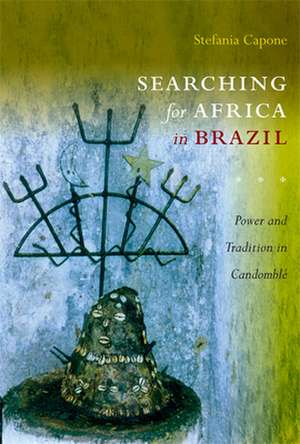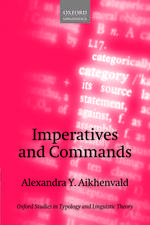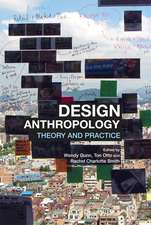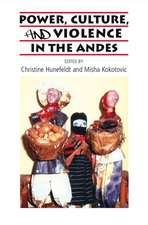Searching for Africa in Brazil – Power and Tradition in Candomblé
Autor Stefania Capone Laffitte, Lucy Lyall Granten Limba Engleză Paperback – 16 mai 2010
Preț: 265.20 lei
Nou
Puncte Express: 398
Preț estimativ în valută:
50.75€ • 52.79$ • 41.90£
50.75€ • 52.79$ • 41.90£
Carte tipărită la comandă
Livrare economică 12-26 aprilie
Preluare comenzi: 021 569.72.76
Specificații
ISBN-13: 9780822346364
ISBN-10: 0822346362
Pagini: 336
Ilustrații: 36 photographs, 6 figures
Dimensiuni: 156 x 233 x 23 mm
Greutate: 0.48 kg
Editura: MD – Duke University Press
ISBN-10: 0822346362
Pagini: 336
Ilustrații: 36 photographs, 6 figures
Dimensiuni: 156 x 233 x 23 mm
Greutate: 0.48 kg
Editura: MD – Duke University Press
Recenzii
The translation of this outstanding work into English is a real service to scholars. Searching for Africa in Brazil is a well researched and carefully argued examination of the ongoing disputations about the origins and transformations in Candomblé. Stefania Capone is particularly insightful regarding the role that outsiders have played in shaping disputes about authenticity, sources, and their relation to African origins.Anani Dzidzienyo, co-editor of Neither Enemies nor Friends: Latinos, Blacks, Afro-Latinos
Searching for Africa in Brazil is a major piece of scholarship. Through careful historical research and vivid ethnographic detail, Stefania Capone demonstrates that conceptual pairs such as pure/impure, religious/magical, traditional/modernized, and communal/individualistic have long played a major role in highly self-conscious and overtly politicized representations of Afro-Brazilian religion. This is so both in regards to practitioners discourses aimed at legitimizing their forms of practice at the expense of their rivals and in regards to the changing views of anthropologists who sought a definitional monopoly over what could count as African, traditional, and so forth.Stephan Palmié, author of Wizards and Scientists: Explorations in Afro-Cuban Modernity and Tradition
Searching for Africa in Brazil is a major piece of scholarship. Through careful historical research and vivid ethnographic detail, Stefania Capone demonstrates that conceptual pairs such as pure/impure, religious/magical, traditional/modernized, and communal/individualistic have long played a major role in highly self-conscious and overtly politicized representations of Afro-Brazilian religion. This is so both in regards to practitioners discourses aimed at legitimizing their forms of practice at the expense of their rivals and in regards to the changing views of anthropologists who sought a definitional monopoly over what could count as African, traditional, and so forth.Stephan Palmié, author of Wizards and Scientists: Explorations in Afro-Cuban Modernity and Tradition
Notă biografică
Stefania Capone
Textul de pe ultima copertă
""Searching for Africa in Brazil" is a major piece of scholarship. Through careful historical research and vivid ethnographic detail, Stefania Capone demonstrates that conceptual pairs such as pure/impure, religious/magical, traditional/modernized, and communal/individualistic have long played a major role in highly self-conscious and overtly politicized representations of Afro-Brazilian religion. This is so both in regards to practitioners' discourses aimed at legitimizing their forms of practice at the expense of their rivals' and in regards to the changing views of anthropologists who sought a definitional monopoly over what could count as 'African, ' 'traditional, ' and so forth."--Stephan Palmie, author of "Wizards and Scientists: Explorations in Afro-Cuban Modernity and Tradition"
Cuprins
List of Illustrations vii
Preface to the American Edition ix
Acknowledgments xi
Some Notes on Orthography and Pronunciation xiii
Introduction 1
Part I. The Metamorphoses of Exu
1. The Messenger of the Gods: Exu in Afro-Brazilian Religions 35
2. The Spirits of Darkness: Exu and Pombagira in Umbanda 69
Part II. Ritual Practice
3. The Religious Continuum 95
4. Reorganizing Sacred Space 121
5. Contesting Power 143
Part III. The Construction of Tradition
6. Exu and the Anthropologists 173
7. In Search of Lost Origins 203
8. Which Africa? Which Tradition? 233
Conclusion 255
Glossary 263
Notes 269
Bibliography 297
Index 311
Preface to the American Edition ix
Acknowledgments xi
Some Notes on Orthography and Pronunciation xiii
Introduction 1
Part I. The Metamorphoses of Exu
1. The Messenger of the Gods: Exu in Afro-Brazilian Religions 35
2. The Spirits of Darkness: Exu and Pombagira in Umbanda 69
Part II. Ritual Practice
3. The Religious Continuum 95
4. Reorganizing Sacred Space 121
5. Contesting Power 143
Part III. The Construction of Tradition
6. Exu and the Anthropologists 173
7. In Search of Lost Origins 203
8. Which Africa? Which Tradition? 233
Conclusion 255
Glossary 263
Notes 269
Bibliography 297
Index 311
Descriere
Analyzes the politics of the "Africanness" of Afro-Brazilian religion, focusing on the conflicts and interplay between academics and practitioners over the past century.
















